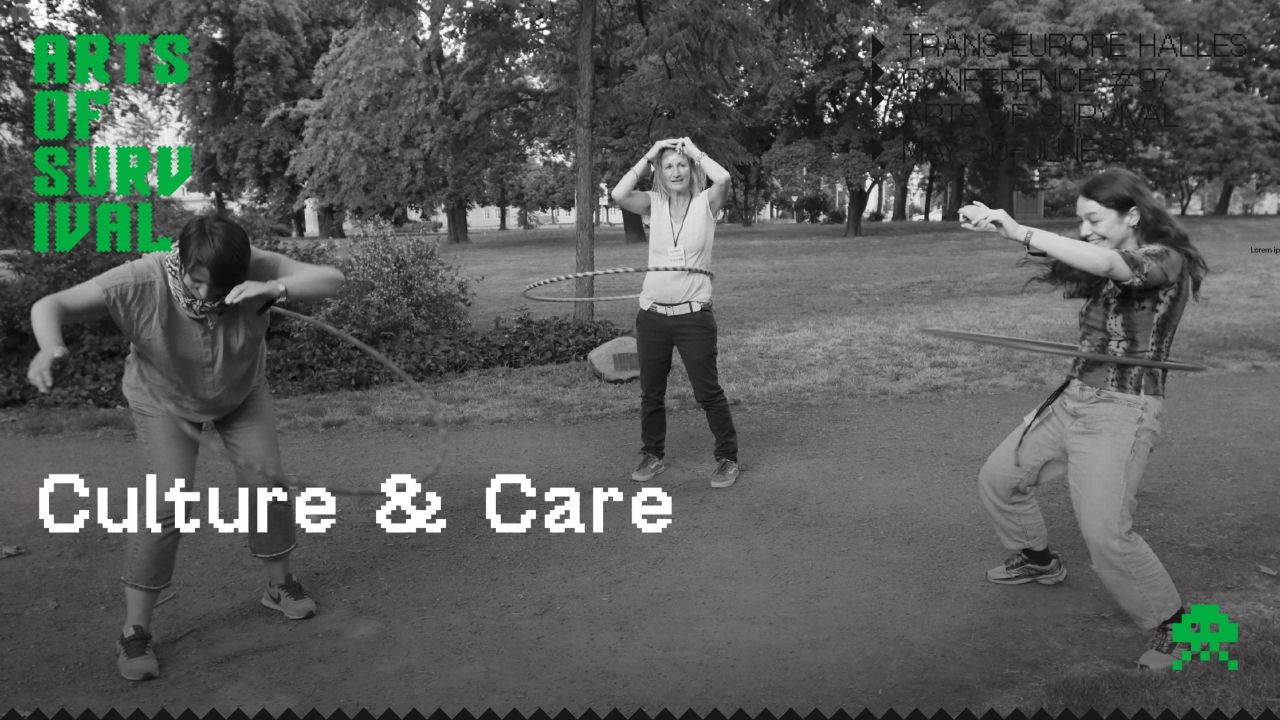Panel discussion Culture and Care: Rebuilding ACP Countries and Ourselves

On May 31, 2024, the panel discussion Culture and Care: Restoring Alternative Cultural Spaces and Ourselves took place in Tartu, Estonia. The event was part of the Alter-Places project, which focuses on sustainable approaches to rebuilding cultural infrastructure.
The panel centered on various forms of solidarity that cultural organizations use to impact the development of urban space around them. These practices are developed by community-based organizations to open up their spaces and enrich them with new knowledge, focused on care, knowledge-sharing, pedagogy, co-creation, and any approach that embraces and encourages diversity in expression and identity. The discussion explored strategies and challenges connected to such transformations, including work organization, building alliances, censorship, instrumentalization — and the space for hope that cultural places and communities can nurture within today’s urban environment.
As urban landscapes embody a range of injustices (including displacement, gentrification, and marginalization), alternative cultural places (ACPs) have expanded their activities beyond the cultural sector, addressing contemporary forms of solidarity. These renewed and often undisciplined practices are cultivated by ACP communities to open their spaces and fill them with new forms of knowledge and competencies — focusing on care, pedagogy, co-creation, and approaches that foster diversity of self-expression and identities.
However, ACPs also face tensions, backlash, official censorship, and hidden forms of self-censorship. This panel discussion explored ACP strategies and the challenges associated with these transformations — such as work structure, alliance-building, censorship, and instrumentalization — as well as the hope that cultural spaces and communities can foster within contemporary urban realities.
Panelists:
- Anastasia Ponomareva — Ukrainian urbanist, architect, cultural manager, and co-founder of Urban Curators and Co-Haty
- Anastasia Gulak — Ukrainian architect, innovation manager, and curator of the IZYUM_recovery project (a ZMINA: Rebuilding sub-grantee)
- Amy Gottung — director, producer, consultant, and writer from Canada
- Louna Sbou — curator, mentor, and cultural producer, director of Oyoun cultural center in Berlin, Germany
- Olivier Le Gal — co-founder, coordinator, and artistic director of La Station — Gare des Mines cultural space in Paris, France
Moderator: Laura Taque — coordinator of La Main, a French cooperative community land trust for independent and alternative spaces.
Anastasia Ponomareva is the co-founder of Urban Curators agency (est. 2015) and the CO-HATY project. Before the full-scale Russian invasion, she worked in Kyiv on projects at the intersection of art, architecture, urban design, and community development.
CO-HATY is a project focused on creating housing for internally displaced people. The team applies architectural and urban expertise, collaborates with local governments and property owners, secures funding for renovations and furnishings, coordinates the building process, and designs custom furniture for renewed spaces.
Anastasia Gulak is a Ukrainian architect, innovation manager, strategist, and concept developer. She is the curator of the IZYUM_recovery project, which aims to develop a visible and sustainable concept for rebuilding a residential district in the heavily damaged city of Izyum. The concept is meant to reflect changes necessary to rethink living spaces for better functionality and stronger connections between people and nature.
Louna Sbou is a curator, mentor, and cultural producer. She is the director of Oyoun in Berlin, an anti-disciplinary arts center focused on queer-feminist, decolonial, and class-critical perspectives.
Her personal experience as a queer Muslim and first-generation immigrant shaped her unconventional professional journey, allowing her to influence the field of contemporary curatorship while experimenting with non-Western models of collective-making.
Olivier Le Gal is a producer and artistic coordinator of Collectif MU, which he co-founded in March 2003 in Paris with three former colleagues from Le Fresnoy. MU’s installations and performances create “reality shifts” through sound and video projections, site-specific walks, or scenographic designs.
In parallel, MU curates programs in contemporary art, music, and cinema. In 2006, Olivier founded REMU, a company that implements MU’s R&D programs and supports other artistic projects. Since 2016, he has been coordinating La Station — Gare des Mines, a repurposed railway warehouse in northern Paris that now serves as a third-space for emerging art and a sound-art laboratory involving several collectives.
The project is implemented with the support of the Creative Europe programme of the European Union.